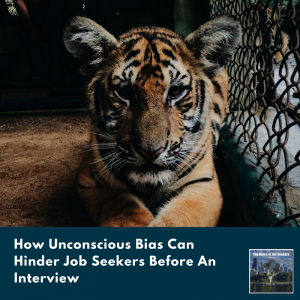
|
Getting your Trinity Audio player ready...
|
Rarely do employers intend to debilitate job candidates – but it happens anyway.
Many job seekers are hamstrung way before their resumes have a chance to stand on their own accomplishments or merits. This happens when the person screening the candidates applies their personal biases.
The University of California, San Francisco, Office of Diversity and Outreach defines unconscious bias as “social stereotypes about certain groups of people that individuals form outside their own conscious awareness.”
Unconscious bias can lead to “microaggressions,” described by Psychology Today as “the everyday verbal, nonverbal, and environmental slights, snubs, or insults, whether intentional or unintentional, which communicate hostile, derogatory, or negative messages to target persons based solely upon their marginalized group membership.”
. They are tough, resilient, and courageous in the face of these experiences. Workplaces that welcome these character traits will likely benefit from having these job seekers on board – as long as bias doesn’t stand in the way of hiring them.
Listen to Facing Unconscious Bias in Your Career and Life
Some Types of Biases Job Seekers Face:
- Bias Toward the Unemployed: Some employers refuse to hire applicants who are unemployed. However, many unemployed and underemployed job seekers are talented and qualified. Often, they have lost their previous jobs due to reasons beyond their control, like downsizing.
- Bias Toward ‘Ethnic’ Fashions: For example, there have been instances where job seekers are terminated or denied job offers on the basis of wearing their hair in dreadlocks, a style traditionally worn by black people. In fact, courts have upheld an employer’s right to do this. Whether I wear dreadlocks or not, it feels like an attack because of my ethnicity.
- Bias Toward Names: Name bias occurs when an employer rejects a candidate based on the way their name sounds – usually because the employer perceives the candidate’s name to sound “ethnic.” I experienced this in action when working with a woman named Latoya several years ago. Her resume was great – an engineering graduate with honors, numerous internship and volunteer positions to prove her competencies – but she received very little response. While tweaking her resume, we changed her name to the family nickname, “Toni.” As a result, she has made several advancements in her career.
- Bias Toward Addresses: Some hiring managers discriminate against candidates whose address are associated with lower-income areas. I knew a manager who would ask candidates how they get to work. Candidates who took cabs were more attractive to this manager than those who took trains and buses.
- Affinity Bias: Another form of bias occurs based on personality traits. Many interviewers are drawn to people who are similar to themselves. This is called “affinity bias.” Corporate relationship expert Tony Chatman reminds us, “If you have an interviewer who is detail-oriented, he or she is likely to hire someone who is introverted and detail-oriented, even if the job doesn’t call for it.”
Listen to Unconscious Bias: Your Career, Workplace, and Everywhere
Common Examples of Bias in Action:
1. Advice about “hard work” directed specifically toward one demographic and/or ethnicity.
Someone I know recently posted on Facebook to say “inner-city” people needed to learn about hard work and that I would be a good example for them. He had trouble making a rational defense of his comments.
How many times have kids from the inner-city who rise to the college ranks heard this rhetoric? Does this advice work for everyone? How do you know if someone “didn’t work hard”?
Implication: “Your people are lazy.”
2. Statements like “I believe the most qualified person should get the job!”
Often, this statement is used to criticize perceived instances of affirmative action. The thing is, not all of us needed affirmative action to enter college or get a job. My merits are just as good as anyone else’s. Why are you questioning them?
Implication: “People of color get an unfair advantage.”
3. Questions about a person’s demographic or ethnic background, like “What kind of name is this?” or “What nationality are you?”
If you can’t offer solid career advice without knowing someone’s nationality, ethnicity, gender identification, or skin color in 2017, then you give lousy and irrelevant career advice. It probably serves no one.
Implication: “You’re not white, so it’s weird.”
4. Backhanded compliments, like “You’re so well-spoken/articulate.”
Are you surprised that I speak well? Or that I learned English so well? Why didn’t you say this to my white counterpart?
Implication: “It’s unusual for someone of your race to speak so well. You don’t belong here.”
5. Employers who only hire currently employed job seekers.
Many mega-talented people become unemployed due to circumstances beyond their control. People are laid off, politically ousted, or recipients of other unfortunate situations.
Implication: “Unemployed people are lazy. They will be desperate.”
6. Unreasonable impatience with a candidate who has an accent.
Being invited to an interview is a privilege, but when an interviewer rushes through a phone screening or other conversation, it can be discouraging or disconcerting. Job seekers with accents unfortunately face this problem often. When a person raises their voice while speaking to someone who has an accent, it’s not just rude – it’s a microaggression.
Implication: “You don’t belong here. You’re not welcome.”
7. Preferential treatment for men in STEM roles.
One study suggests men are often hired over women for jobs involving math and science. There are many women with aptitudes for math and science, which was recently illustrated in the movie Hidden Figures. In one scene in the movie, one of the central characters says, “There wasn’t a protocol for a female in an engineering class.” There isn’t much need to further clarify the insidiousness at work here.
Implication: “You don’t belong here. You’re not welcome.”
8. Using ‘cultural fit’ to exclude certain types of people.
Often, hiring authorities use “cultural fit” and “gut instinct” to make decisions. This leads one to question the validity of their hiring decisions. It also makes one wonder: When employers complain about the skills gap, is it really because they can’t find the skills they need, or is it because the people who have the skills aren’t “cultural fits”?
Job seekers should research the “culture” of a prospective employer. Are they using “skills gap” language to obscure their “cultural” hiring practices? Any workplace that seems overly homogenous may be doing just that.
Implication: “You lack the personality, like-mindedness, or ethnicity to be here.”
–
It is unrealistic to think unconscious bias has a cure. There is no way to absolutely resolve all of it. It is deeply rooted in our daily lives and social interactions, and the lack of discussion about the subject breeds hostility. Unconscious biases are subtle, and they hurt people in subtle ways.
Let me also save you the trouble of trying to make the “victim card” argument: The reality of unconscious biases shows how thick-skinned the majority of job seekers have to become in order to succeed. This is the very quality employers like seeing in job seekers, and they should appreciate more the courage, patience, perseverance, persistence, and resilience job seekers display when facing biases.
This article was originally published on Recruiter.com!
About Mark Anthony Dyson
I am the "The Voice of Job Seekers!" I offer compassionate career and job search advice as I hack and re-imagine the job search process. You need to be "the prescription to an employer's job description." You must be solution-oriented and work in positions in companies where you are the remedy. Your job search must be a lifestyle, and your career must be in front of you constantly. You can no longer shed your aspirations at the change seasons. There are strengths you have that need constant use and development. Be sure you sign up to download my E-Book, "421 Modern Job Search Tips 2021!" You can find my career advice and work in media outlets such as Forbes, Inc., Fast Company, Harvard Business Review, Glassdoor, and many other outlets.
